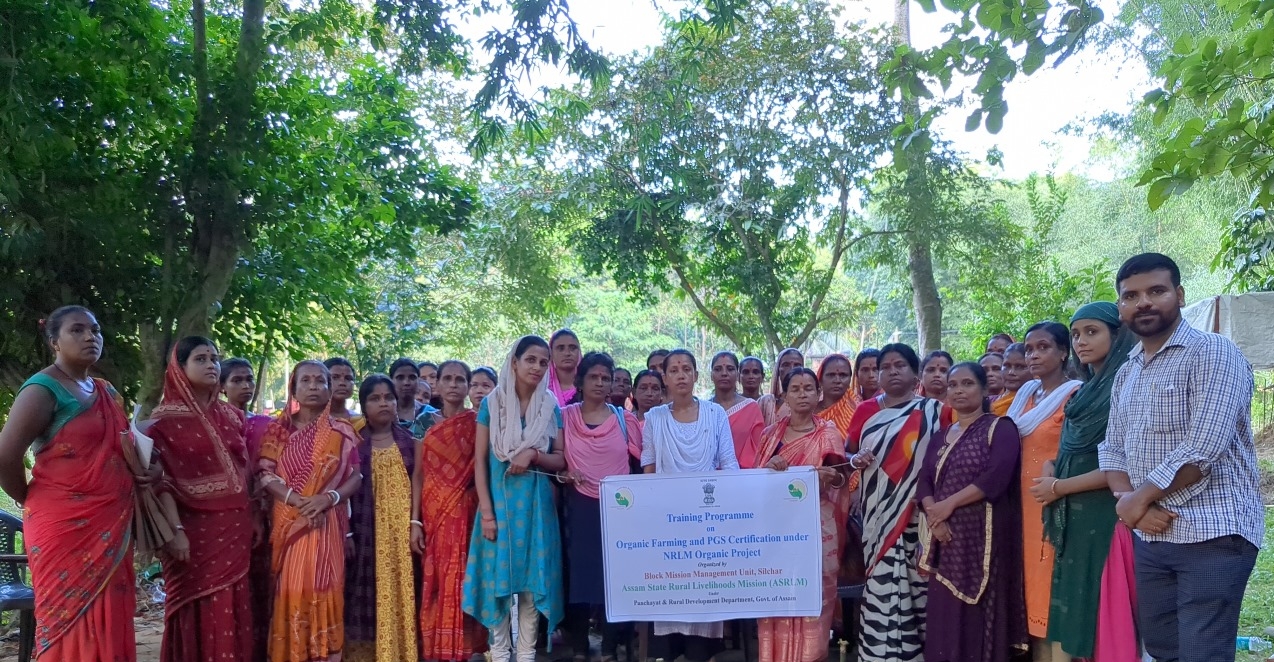The Block Mission Management Unit (BMMU), ASRLM of Silchar Development Block has taken a significant step towards sustainable agriculture by conducting a two-day workshop on organic farming practices. This initiative, aimed at promoting eco-friendly agricultural techniques, has garnered widespread support from the local communities. The BMMU Silchar, ASRLM, as part of its noble cause, has selected six Gram Panchayats for this transformative project, offering practical training in various organic farming methods.
The core objective of this initiative is to introduce eco-conscious agricultural practices that mitigate the harmful effects of chemical fertilizers and promote sustainable farming for a healthier environment and better crop yields. During the two-day workshop, participants received hands-on training in several organic farming techniques, including liquid composting, biochar making, hip composting, vermicompost, and bio-intensive raised bed farming.
One of the primary goals of this endeavor is to empower Krishi and Pashu Shaki (agricultural and livestock workers) with the knowledge and skills required to adopt and propagate organic farming practices within their respective communities. These trained individuals will serve as ambassadors of sustainable agriculture and will further disseminate their newfound expertise to the Self-Help Group (SHG) members. By training Krishi and Pashu Shaki, they hope to create a chain reaction that reaches the SHG members and, subsequently, the entire community. This cascading model of education ensures that organic farming practices become ingrained in the local agricultural landscape.
Organic farming practices offer several advantages over conventional farming methods. They not only reduce the reliance on chemical fertilizers and pesticides but also promote soil health and biodiversity. Furthermore, organic farming contributes to a cleaner environment by curbing the harmful outcomes associated with the use of synthetic chemicals.
In an interview with the BMMU Officials, they expressed their enthusiasm for the project’s potential impact. They stated, “We firmly believe that organic farming is the way forward. It not only benefits the environment but also ensures the production of healthier and safer food for our communities. We are committed to supporting our local farmers in adopting sustainable practices.”
One of the primary focal points of the training was liquid composting, a method that involves the conversion of organic waste materials into nutrient-rich liquid fertilizer. Participants were taught the art of creating biochar, a form of charcoal used to improve soil fertility. Hip composting, another essential technique, was demonstrated to help participants understand how to efficiently compost organic matter.
Vermicomposting, a process in which earthworms are used to decompose organic waste, was another highlight of the training. This method not only produces nutrient-rich compost but also encourages the growth of beneficial microorganisms in the soil. The participants also gained insights into bio-intensive raised bed farming, a practice that maximizes crop yields in limited spaces.
Local farmers and agricultural enthusiasts who attended the workshop were impressed with the practical knowledge they gained. Many expressed their eagerness to implement these techniques in their own fields and gardens. They see organic farming as a sustainable solution to the issues caused by chemical-intensive agriculture.
The success of this initiative has prompted the BMMU Silchar, ASRLM to set its sights on obtaining organic certification for the participating Gram Panchayats. The certification, known as PGS (Participatory Guarantee System), is a testament to the adherence of organic farming principles. Achieving PGS certification would further validate the commitment of the Silchar community towards sustainable agriculture.
As we look to the future, it is clear that the BMMU Silchar, ASRLM’s organic farming initiative is not only transforming the way agriculture is practiced in the region but also fostering a deeper connection between farmers and the environment. The enthusiastic response from local communities demonstrates a growing awareness of the importance of eco-friendly farming practices. The benefits of this endeavor are far-reaching, encompassing not only agricultural sustainability but also healthier living and a cleaner environment for all.
In conclusion, the BMMU Silchar, ASRLM’s two-day workshop on organic farming practices has laid the foundation for a more sustainable and environmentally conscious approach to agriculture in the region. With the support of the community, the Krishi and Pashu Shaki, and the SHG members, this initiative is poised to make a lasting impact, heralding a brighter and healthier future for rural Silchar’s agricultural landscape.

